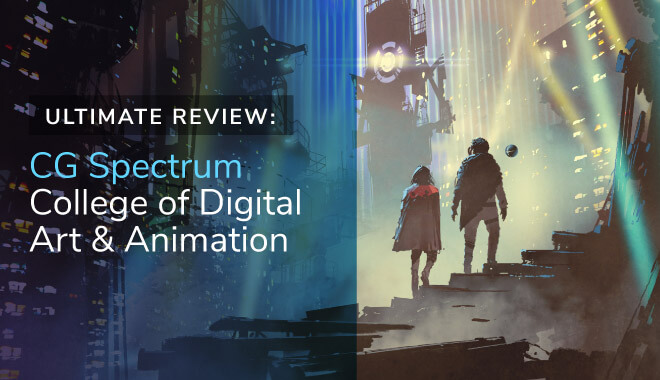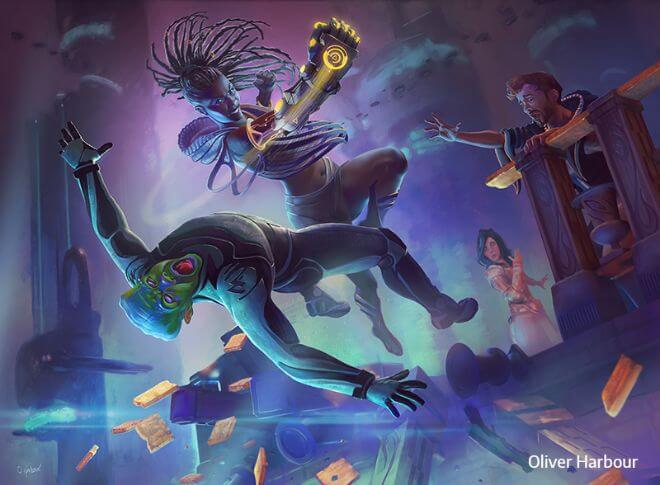 We are reader-supported. Purchases made through links on our site may earn us a commission. Learn More.
We are reader-supported. Purchases made through links on our site may earn us a commission. Learn More.
The broad scope of the internet provides ease of access for nearly everyone, opening doors to new knowledge and social interactions. This is especially true for learning new skills or honing old passions.
What is becoming more common is learning via online classes. It is entirely possible to earn a degree online, even I’ve done it. In our busy lives, we don’t have time to tackle everything in one day.
The CG Spectrum College of Digital Art & Animation is bringing design principles from the physical classroom to the online webspace.
They encourage aspiring designers of all ages and aspirations to apply. Whether you’re fresh out of high school and ready to take on the world, or looking for a mid-career change. Their VFX, Animation, and Game Development curriculum and schedule can work for you.
With all that said, online digital design schools can be hit or miss. Is CG Spectrum really worth your time and money?
Let’s take a deeper look at CG Spectrum’s program and find out.
Learning Online: What Are the Benefits?
There are definite benefits to learning online. Especially if you’re exploring a concentration within the creative field.
Flexibility
First, if you have a job or would simply prefer a flexible class schedule, online learning offers a variety of scheduling options to fit your life. You’re able to carry on with hobbies, social relationships, and career.
Accessibility
There’s also the matter of students not living near their desired school. If you aren’t able to travel, what are the chances that you will be able to start your design education?
Advancement
If you’re a developer or a designer looking to advance your knowledge and skills, online training offers a great opportunity. You aren’t constrained by 50-minute classes, and you won’t have to spend extra time in the university’s computer lab trying to make deadlines. All you need is a reliable internet connection, a solid computer to run the software, and violà.
CG Spectrum
CG Spectrum, as advertised, is a completely, 100% online designer school for those looking to build a foundation in which to make great creative projects, or master their existing knowledgebase. No travel necessary; it’s all online.
You will interact with mentors through webcam chats with one-on-one sessions that emphasize the student’s wants and needs, a feature I consider valuable.
They’re physically headquartered in Australia, but in (virtual) reality, they are headquartered right on your internet. They are also an Unreal Academic Partner, Unreal Authorized Training Center, SideFX Certified Training Provider, and Toon Boom Authorized Training Center.
What Does CG Spectrum Offer?
CG Spectrum offers a wide array of classes and pathways. As of right now, they offer:
- Game Development courses (Game Design, Programming, Game Art & Animation)
- Real-time 3D Technical Art & Virtual Production courses
- 2D & 3D Animation courses
- 3D Modeling courses
- Visual Effects courses
- Concept Art courses
- Digital Illustration courses
Who Would Benefit?
CG Spectrum is for anyone with a desire to learn more and enhance their skills in animation, development, and design.
Since CG Spectrum is completely online, it caters to those who are looking for quality education in design or those who cannot attend a standard university or design school; either by distance, scheduling, or financial reasons.
This gives someone who is roughing it alone in Alaska, for example, a fair shot at creating some great content!
Mentors

CG Spectrum’s mentorship system is probably their best feature! This program matches you with an industry veteran for your tenure at CG Spectrum.
You can speak to them, ask questions, and learn invaluable information about the industry. Your mentor will also give you weekly updates, critique your work, and a whole lot more through a Zoom call.
This includes 140+ mentors from all over the world, in every time zone. You will have mentors like:
- Troy Dunniway, Game Design (Rainbow Six Vegas, Munch’s Oddysee, Command and Conquer)
- Scot Bayless, Game Development (Sonic the Hedgehog 2, 007: Everything or Nothing, Devil May Cry)
- Daniel Hourigan, FX (John Wick: Chapter 3 – Parabellum, Game of Thrones, The Wolverine)
- Firas Hosn, Game Programming (Far Cry, Assassin’s Creed and Watchdogs franchises)
- Bryan Bentley, 3D Modeling (Pacific Rim, Warcraft)
- Brandon Reimchen, Concept Art (EA, Activision, Disney Interactive)
- Scott Claus, 2D Animation (Pocahontas, Hunchback of Notre Dame, Road to El Dorado)
- Simon Warwick, Real-time 3D & Virtual Production (Batman: Arkham City)
- Sean Amlaner, Compositing (Star Trek: Picard, Star Wars: The Rise of Skywalker, Avengers: Infinity War)
- Spectra, 3D Animation (Far Cry 6, Uncharted 4)
- William Faucher, Real-time 3D & Virtual Production (Real-time Artist & YouTuber)
- Carl Shedd, Real-time 3D & Virtual Production (Borderlands, Rage)
- Bernie Kang, Concept Art (World of Warcraft, Starcraft 2, Diablo 3)
- Eric Wilkerson, Digital Illustration (Magic: The Gathering)
- Hong Chan Lim, 3D Modeling (Overwatch 1 & 2, WildStar)
- Brittany Piacente, VFX (Loki, Star Wars: Episode VIII – The Last Jedi, Black Panther, Blade Runner 2049)
- Genevieve Camilleri, VFX (Love and Monsters, Kong: Skull Island, Mad Max: Fury Road)
These mentors will be available for on-demand videos, live chat, and most importantly, advice and insight into creative projects.
Faculty
Any institution worth its salt is only as good as its instructors, and here is where CG Spectrum shines. They employ both veterans of animation, as well as experts currently working within the industry. For digital design, you absolutely need those strong, prominent voices from different fields to help you on your way. This is a plus.
Along with the faculty, they allow students to meet with them, either through weekly video chats or via the online community.
There are also Technical Assistants who are always around to help troubleshoot. They organize regular challenges to help students practice their skills and get to know each other.
Interested? Here’s How it Works
First, you’ll need to fill out an application and contact their admission department for things like scheduling, tuition questions, and any other questions you may have. After you have figured that out, it’s time to move on to the curriculum.
Like many online courses, you can start immediately by either watching or reading pre-recorded lectures. From there, it’s up to you. You can research, and complete your assignments on your time.
As you work, you’ll have access to your mentor, eventually giving the instructor your draft of that week’s work. You’ll then meet with the instructor (via video chat) for questions and review.
An added bonus is that your Q&A sessions are recorded. This means you can reference the recording anytime you need it.
After making any improvements, you’ll hand in your assignment.
From there, you’ll build on what you’ve learned with a new project, using the same process as before. Before you know it, you’ll have a functional prototype you can be proud of.
Virtual Community
Like any good online community, CG Spectrum has discussion boards. Like with many other online outlets, this is where students, mentors, and others can all come together and share projects, tutorials, and more.
Programs Offered
Let’s start with animation and which classes, design aspects, and specializations you’ll learn:
Animation
Introduction to 3D Animation
- Beginner ⋅ 3 Months
- Weekly Online, 20 hours
- For animation rookies, this is a solid place to start your 3D design journey.
3D Animation Course
- Beginner ⋅ 9 Months
- Weekly Online, 20 hours
- Build strong 3D foundations working your way up to animating a believable fight scene from scratch using Maya. Term 1 of this 3D animation course is the same curriculum as the introduction course, so if you’ve already completed the intro, you can jump to term two.
Advanced 3D Animation Course
- Intermediate to Advanced ⋅ 9 Months
- Weekly Online, 20 hours
- This is where your 3D knowledge will be put to the test with advanced character acting and creature animation. All of the advanced courses include a portfolio and career development term to help get you job-ready. In the end, you’ll get your animation certificate of completion and have a cool portfolio. (Prerequisite = The 9-month 3D animation course)
Introduction to 2D Animation
- Beginner ⋅ 3 Months
- Weekly Online, 20 hours
- Like the 3D animation courses, 2D delves into the rich and creative world of 2D design. Use this as a stepping stone towards more advanced classes, and eventually, a certification. Using software like Toon Boom Harmony, you’ll learn physics, principles of animation, and more.
2D Animation Course
- Beginner to Intermediate ⋅ 9 Months
- Weekly Online, 20 hours
- Learn hand-drawn style character and creature animation, finishing with a pantomime and 2-person dialogue scene. Term 1 of this 2D animation course is the same curriculum as the introduction course, so if you’ve completed the intro, you go straight to term 2.
Advanced 2D Animation Course
- Intermediate to Advanced ⋅ 9 months
- Weekly Online, 20 hours
- This is where you’ll put everything you know about 2D animation to the test. Get the hang of cut-out animation and have fun with ToonBoom’s FX and compositing tools. You’ll also be taught by some serious talent. Ever heard of Disney or DreamWorks? Learn from artists like Scott Claus who worked at both of those iconic studios, and other 2D artists who worked on hits like Klaus or Rick & Morty.
3D Modeling
Introduction to 3D Modeling
- Beginner ⋅ 3 Months
- Weekly Online, 20 hours
- This is where you’ll get to dip your toes into the waters of 3D modeling. The process of creating characters, worlds, and environments will make a lot more sense after completing this class.
3D Modeling Course
- Beginner ⋅ 9 Months
- Weekly Online, 20 hours
- Build realistic and stylized props, characters, creatures and environments for films and games using Maya, ZBrush and Substance Painter. Term 1 of this 3D modeling course is the same curriculum as the introduction course, so if you’ve already completed the intro, you can jump to term 2.
Advanced 3D Modeling Course
- Intermediate to Advanced ⋅ 9 Months
- Weekly Online, 20 hours
- Putting your 3D modeling skills to the test, this class will introduce more advanced concepts for you to explore and ultimately prepare you for a career as a 3D modeler for film and games.
Digital Painting

Introduction to Concept Art & Illustration
- Beginner ⋅ 3 Months
- Weekly Online, 20 hours
- Fans of iconic concept art like the films Star Wars and Dune will feel right at home here. If drawing out your ideas is your forte, this is the avenue you should take.
Concept Art & Illustration Course
- Beginner to Intermediate ⋅ 9 Months
- Weekly Online, 20 hours
- Start to discover your unique artistic style here. Learn art fundamentals like composition, color, value, light, perspective and anatomy. Your mentors could be artists who have worked on games like World of Warcraft and Magic: The Gathering.
Advanced Concept Art Course
- Intermediate to Advanced ⋅ 9 Months
- Weekly Online, 20 hours
- Taking what you now know regarding concepts and workflow, you will map out your advanced journey towards a concept art diploma. This is where your portfolio will truly shine.
Advanced Illustration Course
- Intermediate to Advanced ⋅ 9 Months
- Weekly Online, 20 hours
- Level up your skills and portfolio by learning how to make cool art for films, video games and publishing. It’s not just the technical skills, you’ll learn how to work with clients, and different ways to promote yourself, and pros and cons of freelance vs working in a studio.
Game Development
Introduction to Game Design
- Beginner ⋅ 3 Months
- Weekly Online, 20 hours
- Start your game design journey with game mechanics, systems, genres, level design and world-building. Then build your own game in Unreal Engine.
Game Design Course
- Intermediate ⋅ 9 Months
- Weekly Online, 20 hours
- Learn the ins and outs of game design. Ever wondered how certain game elements interacted with each other? Here you will finally find out the ‘mysterious’ aspects behind some of our favorite games.
Introduction to Game Programming
- Beginner ⋅ 3 Months
- Weekly Online, 20 hours
- No coding skills needed to start this course. Learn C++ and essential game programming concepts, and build a basic game from scratch.
Game Programming Course
- Intermediate⋅ 9 Months
- Weekly Online, 20 hours
- This is where it gets interesting! Using C++, build fun 2D and 3D levels in Unreal Engine with interactive animated characters.
Foundations for Game Art & Animation
- Beginner ⋅ 10 Months
- Weekly Online, 20 hours
- Learn 3D animation and modeling, and apply them to advanced game design. You’ll build worlds, characters, and more using software like Maya and Unreal Engine.
Real-Time 3D & Virtual Production
Introduction to Real-Time 3D & Virtual Production
- Beginner to Intermediate ⋅ 3 Months
- Weekly Online, 20 hours
- This short course helps beginners wanting to work in film or games get the hang of Unreal Engine and surrounding pipelines including basic rigging, animation, and motion capture.
Real-Time 3D Technical Art & Virtual Production Course
- Intermediate to Advanced ⋅ 9 Months
- Weekly Online, 20 hours
- There’s a lot of demand for skilled real-time 3D technical artists, and this course prepares you for just that. Learn virtual production fundamentals, world building, lighting and camera essentials.
- By the time you’re done, you’ll have made a film quality cinematic shot using Unreal Engine.
- CG Spectrum is an Unreal Authorized Training Center and Unreal Academic Partner
Visual Effects
Foundations for Visual Effects
- Beginner ⋅ 9 Months
- Weekly Online, 20 hours
- How does a character like Sephiroth from Final Fantasy execute his magical attacks? In this class, you’ll utilize software like Maya, Substance Painter, Houdini and Nuke to create your own visual effects.
Introduction to Houdini FX
- Beginner ⋅ 3 Months
- Weekly Online, 20 hours
- Sometimes you just want to blow stuff up! Learn scripting with VEX, particles, advanced geometry, and use Houdini to create believable explosions and natural disasters.
Houdini FX Diploma
- Intermediate to Advanced ⋅ 10 Months
- Weekly Online, 20 hours
- Using Houdini software will be essential for your VFX adventures in the industry. Every FX artist needs to know how to create destruction, explosions, and water simulations. The course also covers how to model, texture, simulate, and render your cool VFX shots from scratch.
- SideFX Houdini Certified School
Introduction to Nuke VFX Compositing
- Beginner ⋅ 3 Months
- Weekly Online, 20 hours
- Learn to integrate digital assets with live-action footage using Nuke software. Practice basic rotoscoping and green screen keying, then build a VFX shot from scratch.
Nuke VFX Compositing Course
- Intermediate to Advanced ⋅ 9 Months
- Weekly Online, 20 hours
- Once again, focusing on cutting-edge software in the business, in this class you’ll learn everything you need to know about Nuke compositing, including rotoscoping, digital painting, keying, scripting, lighting deaging, set extensions, and other advanced techniques used by top VFX studios.
Tuition and Fees

Of course, this impressive list of courses and industry veteran assistance doesn’t come for free.
Applying for CG Spectrum is as simple as filling out an online form, followed by waiting for a response from the school to help get you started. You’ll also have the opportunity to ask any questions you may have.
Unfortunately, CG Spectrum does not offer financial aid or scholarships. You can contact them further regarding any financial questions and their payment plan options.
Why Go to CG Spectrum?

It seems that this school has a lot to offer. The curriculum’s a good fit for most digital design beginners. We probably wouldn’t recommend them for graphic or web design. The focus is primarily on character, environment, digital effects, and game development.
Career Specific Training
CG Spectrum provides specific, job-based training. There are no guarantees, but this should only help graduates find a job.
They also have an in-house Career Development Manager who offers free career services like portfolio/CV reviews, help with job applications, interview practice, and exclusive events with studios and industry guests.
Classroom Size
Another attractive aspect is the class sizes. Say goodbye to online classes of 30 or more. Your classes would be capped at a maximum of 4. This intimate atmosphere allows for a more comprehensive and focused relationship between students and instructors.
Mostly Positive Reviews
This all sounds great, but what are people saying about CG Spectrum? Lauren Wakley, a game illustrator, gives a glowing review:
“As an aspiring Concept Artist, it’s been amazing to have an industry professional as a mentor…Having one on one feedback has been so helpful…I’ve learned so much in these past six months and have also gained much more motivation to work hard for my dream job.”
Another student, Forrest Anthony, had this to say about his positive experience:
“The very personal learning experience I had through CG spectrum encouraged me to dig deep with questions and figure out how to really improve. I got the attention I needed from my mentor and broke through the frustrating plateau I had been at before starting.”
A Reddit user had this to say:
“My mentor hasn’t worked on AAA games but is working in the industry and still has an impressive portfolio. It seems like the mentors have mixed backgrounds and it’s kinda random which one you’re going to get, although you could probably ask when a certain mentor would be available and wait until they have a class (not positive though).”
What’s the Verdict?
Ultimately, CG Spectrum is for those who are looking for a high-quality curriculum, with the flexibility of learning online. We like the program for Animation, effects, and game dev, but probably not for web or graphic design.
If you’d like even more information, you can request free info here, and explore some of their free resources here. These include models to toy around with and outlines for some basic design projects.



